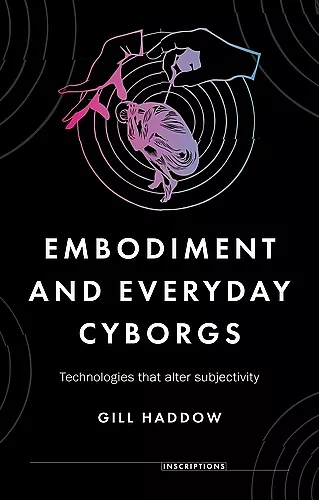Embodiment and Everyday Cyborgs
Technologies That Alter Subjectivity
Format:Hardback
Publisher:Manchester University Press
Published:25th May '21
Should be back in stock very soon

Your organs are failing and require replacement. If you had the choice, would you prefer organs from other humans or non-human animals, or would you choose a ‘cybernetic’ medical implant?
Using a range of social science methods and drawing on the sociology of the body and embodiment, biomedicine and technology, this book asks what happens to who we are (our identity) when we change what we are (our bodies)? From surveying young adults about whether they would choose options such as 3-D bioprinting, living or deceased human donation, or non-human animal or implantable biomechanical devices, to interviewing those who live with an implantable cardiac defibrillator, Haddow invites us to think about what kind of relationship we have with our bodies. She concludes that the reliance on ‘cybernetic’ medical devices create ‘everyday cyborgs’ who can experience alienation and new forms of vulnerability at implantation and activation.
Embodiment and everyday cyborgs invites readers to consider the relationship between personal identity and the body, between humans and non-human animals, and our increasing dependency on ‘smart’ implantable technology. The creation of new techno-organic hybrid bodies makes us acutely aware of our own bodies and how ambiguous the experience of embodiment actually is. It is only through understanding how modifications such as transplantation, amputation and implantation make our bodies a ‘presence’ to us, Haddow argues, that we realise our everyday experience of our bodies as an absence.
An electronic edition of this book is freely available under a Creative Commons (CC BY-NC-ND) licence.
'The text moves between sociological and philosophical focus, with the potential to generate interest in a variety of fields. Through its detailed analysis of ICD patients and their experiences, its most significant contributions are to medical sociology and technology studies – scholars from which will afford great benefit from engaging with it.'
Rose Porter, New Genetics and Society
'The frequency of biomedical interventions—organ transplants, xenotransplants, implantable cardiac devices, 3-D bioprinting—in humans has raised myriads of philosophical and sociological questions about the identity (subjectivity) of the resulting bodies. Haddow ingeniously addresses such questions in this book. Drawing from both theory and empirical evidence, she distinguishes "everyday cyborgs" from the perceived monstrosity of fictional cyborgs. The key question she engages is whether biomedical interventions alter the identity of their human recipients. She cites evidence from selected informants—patients who received organ transplants—that affirm alteration in their thoughts and behaviors. Another group of Haddow's informants report having refused xenotransplants (cross-species organ donations) as "yucky." Most respondents in Haddow’s study are more accepting of technologies such as 3-D bioprinting than xenotransplantation, as in the former case, the recipient becomes the donor (having a needed organ "harvested," i.e., bioprinted, from the body). Haddow makes a significant contribution to the sociology of the body, furthering the social-scientific understanding of everyday cyborgs as biomedically enhanced but modified humans and of the impact of techno-organic hybridity on their subjectivity. Students and scholars of bioethics, medical sociology, cyborg anthropology, and STS (science, technology and society) will find this book interesting.
Summing Up: Highly recommended. Upper-division undergraduates. Graduate students and faculty. General readers.'
T. Niazi, University of Wisconsin, CHOICE (June 2022)
ISBN: 9781526114181
Dimensions: 216mm x 138mm x 16mm
Weight: 417g
208 pages